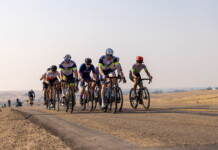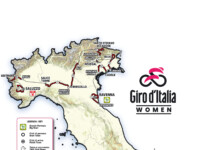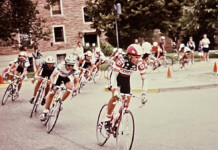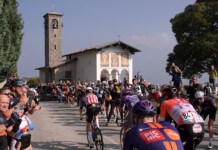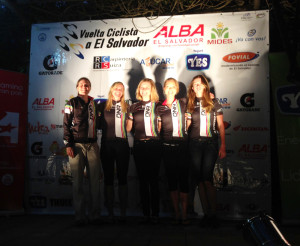
By Jared Eborn
Utah’s elite women’s cycling team – DNA Cycling-K4 Racing powered by Blendtec – is entering its second year and aims to make a big impact on the domestic racing scene. But that doesn’t mean the women’s team with a heavy Utah flavor is confining itself to races in the U.S. of A.
No, with an opportunity to race against some of the top talent in the western hemisphere, the DNA-K4 team sent a handful of racers to El Salvador for a week of action in March 2014.
And what a week it was.
With travel nightmares, incredible courses, world class competition and even some tragedy mixed in, the 2014 Vuelta Ciclista a El Salvador was a great introduction to international racing for the DNA/K4 women.
Anne Perry, the reigning masters world champion, was part of the DNA-K4 crew – along with Kemi King, Breanne Nalder and a few guest riders – said it was an eye-opening experience in many ways.
“Overall the races were very challenging. The peloton felt nervous. I got the sense that many of the women were not so experienced and not comfortable riding in large groups, which made the rest of us nervous,” Perry said. “One woman I met was from Trinidad – Tobago and the biggest field she’s ever ridden in was maybe 40 people. She was cool though and recognized her inexperience and stayed in the back. Other riders weren’t so courteous and caused a lot of crashes.”
The week of racing in El Salvador started out with three one-day races and a break before the stage race. Several top-level teams sent riders to the race including the powerful United Healthcare squad.
That kept the racing fast and gave DNA-K4 a chance to see how they stack up against some of the nation’s best women.
When the stage race began, the action was relentless.
“We were able to keep three riders (guest rider Tatyana Riabchenko, Anne Perry and Breanne Nalder) in the lead group all day and at least one rider in key breakaways. Anne and Tatyana finished 6th and 16th in the lead group, just 4 seconds off of the leader,” team general manager Alex Kim said in a statement. “Breanne finished 28 seconds back in 19th place. Fantastic results for the team.”
But with unexpected racing dynamics – such as courses open to traffic, road damage and other things – the race conditions were never a sure thing and added an edge to every pedal stroke.
“We often raced on the freeways and had rumble strips to navigate. Roads were tough. There was debris, potholes, speed bumps of all sizes and shapes. The worst were the speed bumps the size of a softball that were embedded in the road in rows of 2 or 3 and spaced such that a skinny tire would get caught in between them. I call them “death bumps”. Nobody ever pointed them out so you had milliseconds to respond. Not so bueno,” Perry said. “One race we came into the final kilometers and the road wasn’t closed so we had trucks turning left in front of us making us come to almost a complete halt. We were dodging cars all the way to the finish. It was mayhem. One of the stages had us go through a small town before the finish and the road again wasn’t closed so here we are the top 20 in the peloton barreling down this narrow pot-holed road with people hugging the sidewalks and a big dump truck is blocking the entire street. It was hilarious. All of us had to stop and wait for it to turn.”
Stage Two of the race was also a tragic stage. A helicopter providing media coverage of the race crashed, killing the pilot and photographer on board.
“This was a shocking blow to our whole race family – it takes a lot of riders and crew, race staff, officials, and media to pull off an event like this – and every one of us is affected,” Kim said. “We hope that we are able to pay our respects to him and his family as the race moves forward.”
Stage three was somber as riders departed the start line.
“Stage three started with a moment of silence and 20km of neutral to honor the two lost in the helicopter accident yesterday,” Kim said. “This was followed by 88km of racing, with again, a lot of climbing. We finished three riders in the top half with Anne Perry finishing in 16th place, just 21 seconds back from today’s winner, our former teammate and Brazilian National rider, Flavia Oliveira.”
The final stage was the DNA-K4 team race hard and chase results as their international experience wrapped up.
“All four of our remaining riders, Tatyana, Kemi, Anne, and Breanne, finished with the front of the race just three seconds back from the winner,” Kim said. “DNA-K4 finished the stage race with three riders in the top 20, general classification. With the 13 international teams racing, we placed 5th in the general team competition.”
The racing was hard and, according to Perry, a bit of an adventure. “Another race, I had been dropped on the final climb and clawed my way back through the follow cars to the finishing group of 15 only to be spat out the back again in the last kilometer on rough bumpy roads with tight corners and a dog runs out straight at me as me and another rider are chasing the sprint,” Perry said. “I seriously expected dog guts to fly up in my face from my chain rings. He was that close. But I made it through with no blood and was only 20 seconds off the finisher. Scary.”
The experience also made Perry grateful for racing conditions in the U.S.
“The race bible was often wrong. On the Grand Prix de San Salvador the final climb started 5km before it was supposed to…and finished 5 km before it was supposed to,” she said. “I was stoked on that because I was hurting pretty badly on that climb and didn’t know when I was going to pop! Other days the race was 3-4 km longer than published. Those days sucked.”
Still, Kim said the experience was well worth the trip.
“As a small, relatively new team, we are very happy with how our first international UCI race went,” Kim said. “It has certainly been an honor competing with international pros.”

